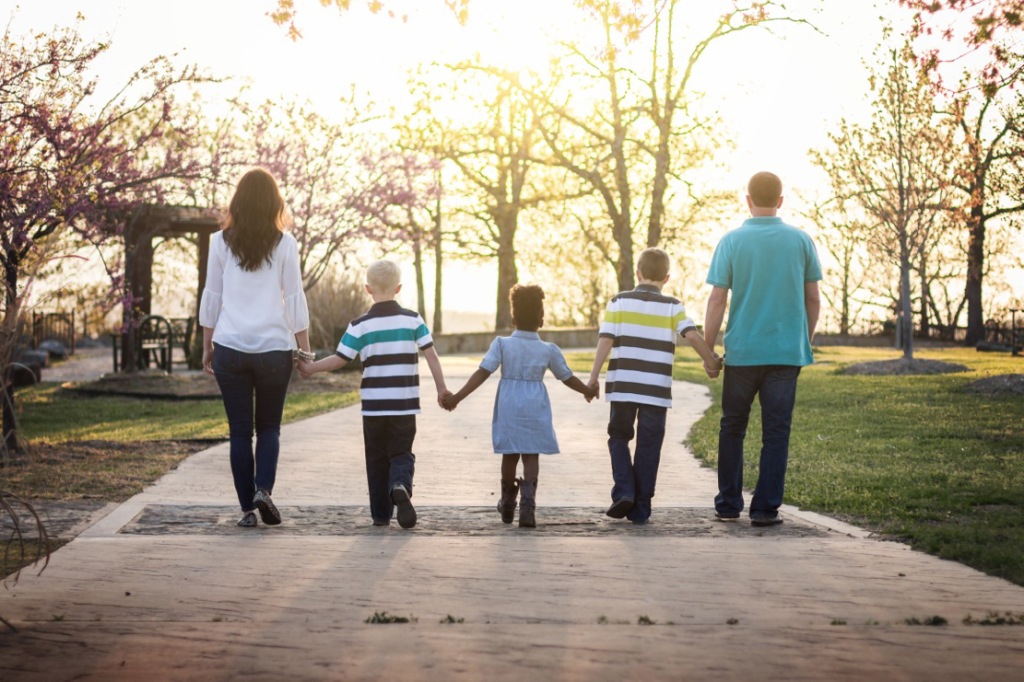She stood in the middle of Build-a-Bear, clutching her new stuffed bunny, with tears streaming down her face.
We were there to continue the tradition of letting each child choose an animal, stuff it, bathe it, and name it. And each time a child goes through the process, my husband and I sneak off to record our voices onto a little device, which is placed in the animal’s paw. At bedtime, or anytime they just need to hear us say we love them, they can press the stuffed animal’s hand. We loved watching our daughter take great care in making the bunny her own.
Finally, she took “Stuffy” in her arms and pressed the hand. Our recorded voices started, telling her how much we loved her. She looked up at our excited faces and started sobbing.
As much as we wanted to believe her tears were due to her overwhelming happiness, I knew it wasn’t true. We were spending the evening celebrating her one-year anniversary in our family with dinner and a trip to Build-a-Bear. Because Matt and I were going to be out of town on her homecoming anniversary, we went the week before. We wanted some family time before we left anyway, and we loved the idea of leaving our voices at her fingertips while we were gone.
We presented the evening as a celebration of one year as a family of five, not specifically about her. But she’s a smart girl. She knows we are only a family of five because she’s in it. And so the tears came.
For adopted children, sometimes celebrating a new family is a stark reminder of the family they lost. Often, the times we think will be most joyful- birthdays, holidays, “Gotcha Day”- actually bring up the deepest pain.
So we tread lightly. And when unexpected tears come, we hug harder and don’t try to force words. We love them, we cry with them, and we try to imagine what that pain might feel like. Some have called the loss of one’s biological family a “primal wound,” and from parenting two adopted children, I would have to agree. There’s no way for me to explain the pain that comes from that loss having never lived it. But I witness it often.
For some adoptees, there’s the added pressure of feeling like they need to seem happy about their adoptions 100% of the time because the alternative would be a betrayal to their adoptive family. One of our goals in adoptive parenting is for our kids to know they can be sad or confused or angry about their adoptions, and we will be there with them in it. They can talk to us without worrying if we’ll take their pain personally and make it about us. As we have said repeatedly to them, they can (and do) miss their first families and love us at the same time.
Their grief is not about us.
I was talking with our son the other day about how we can respond when others say things that feel uncomfortable to us. That’s a pretty common experience for any adoptive family, and even more so for a transracial, adoptive family. One example we talked about was what he thinks or can say when someone says he and his sister are lucky to have been adopted into our family. He looked at me with genuine disbelief and said the perfect thing.
“Lucky? But I lost my other family.”
That’s why we don’t celebrate Gotcha Day.
__
Every family and every adoptee is different. I can speak only to what works for our family right now (it might be different in a few years even). Every family has to do what’s best for them at the time.
____________________________
Matt and Becca write about marriage, parenting, and life through the lens of a married couple, parenting team, and pastor and professional counselor. They share hope and restoration by giving a glimpse into their lives- the failures, the successes, and the brokenness and beauty of everyday. You can read more of their writing at WhitsonLife.


